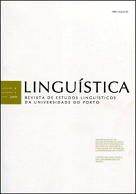Variation and change in sixteenth-century unstressed vowelism: scriptural practices and normative judgments
Abstract
Following a recent study (Paiva 2008) of the 16th century unstressed vowels based on the descriptions of contemporary grammarians that confirmed the raising of unstressed <a>, I continue the research about the raising of the remaining unstressed vowels based on the computer processing of the metalin- guistic texts of this period, which allowed the exhaustive examinations of the writings, in connection with the expressed value judgements. In order to achieve this, I describe the statu quo of the variation before the relatinisation, the conse- quences of this movement whether on the elimination of the previous schemata of variation or on the production of new ones; I delimit the change of <e>> <i>, interpret non usual writings with <e>, and infer that this kind of writing variation derived from the fact that <e> represents already []. Regarding [o], the unidirec- tional drift that since the Middle Ages leads to [u] (and witch the relatinisation strengthens) is clearly documented and raises negative evaluation judgements that reveal undoubtedly the ongoing dynamics.
References
Ali, M. S. 1966. Gramática Histórica da Língua Portuguesa. 6ª ed. Rio de Janeiro: Edições Melhoramentos.
Andrade, A. 1996. Reflexões sobre o ‘E mudo’ em português. Actas do Congresso Internacional sobre o Português. Lisboa: Edições Colibri, II, 303-344.
Cunha, A. G. da. 1980. Índice Analítico do Vocabulário de Os Lusíadas. 2ª ed. Rio de Janeiro: Presença.
Cunha, A. G. da. 1996. Dicionário Etimológico Nova Fronteira da Língua Portuguesa. 2ª ed., reimp. Rio de Janeiro: Editora Nova Fronteira.
Cunha, C. F. da. 1982. Sobre o e paragógico na épica e na lírica. Estudos de Versificação Portuguesa (séculos XIII a XVI). Paris: Centro Cultural Português.
Labov, W. 1984. Sociolinguistc Patterns. 3ª ed. Philadelphia: University of Pennsylvania Press. [1ªed.: 1972].
Machado, J. P. 1990. Dicionário Etimológico da Língua Portuguesa. 6ª ed. Lisboa: Livros Horizonte.
Maia, C. de A. 1986. História do Galego-Português. Estado linguístico da Galiza e do Noroeste de Portugal desde o século XIII ao século XVI. Coimbra: INIC.
Marquilhas, R. 2000. A Faculdade das Letras. Leitura e Escrita em Portugal no séc. XVII. Lisboa: Imprensa Nacional.
Mateus, M. H. M.; Martins, M. R. D. 2002. Contribuição para o estudo das vogais átonas [ə] e [u] no português europeu. Biblos. LVIII: 111-128. Reproduzido em: Martins, M. R. D. 2002. Fonética do Português. Trinta Anos de Investigação. Lisboa: Caminho, 169-186.
Massini-Cagliari, G. 1999. A paragoge rítmica na lírica profana galego-portuguesa. Actas do XIV Encontro Nacional da Associação Portuguesa de Linguística (1998). Lisboa: Colibri/APL. II, 169-182.
Nunes, J. J. 1956. Compêndio de Gramática Histórica Portuguesa (Fonética e Morfologia). 5ª ed. Lisboa: Livraria Clássica Editora [1ª ed.:1919].
Paiva, M. H. 2002. Os Gramáticos Portugueses Quinhentistas e a Fixação do Padrão Linguístico. Contribuição da Informática para o estudo das relações entre funcionamento, variação e mudança. Vol. I: Objecto e Método; Vol. II: Pré- edições; Vol. III : Índice Geral de Vocábulos, Índices Alfabéticos de Formas de Outras Línguas; Vol. IV: Conclusões. Dissertação de doutoramento. Porto: Faculdade de Letras da Universidade do Porto.
Paiva, M. H. 2008. A descrição do vocalismo átono quinhentista: linhas e entrelinhas nos textos metalinguísticos coevos. Linguística. 3(1): 197-221.
Paiva, M. H. No prelo [Fernando Oliveira] A língua da Gramática à luz do outros textos. In: C. Morais (Org.) Fernando Oliveira, Um Humanista Genial. Aveiro: Universidade de Aveiro.
Silva, R. V. M. e 1989. Estruturas Trecentistas. Elementos para uma gramática do Português Arcaico. Lisboa: Imprensa Nacional.
Teyssier, P. 1966. La prononciation des voyelles portugaises au XVI siècle d’après le système orthographique de João de Barros». Annali [Nápoles: Istituto Universitario Orientale]. VII(1): 127-198.
Teyssier, P. 1982. História da Língua Portuguesa. Tradução de Celso Cunha. Lisboa: Sá da Costa [1ª ed. francesa: Paris: P.U.F., 1980].
Williams, E. B. 1975. Do Latim ao Português. Trad. 3ª ed.: Rio de Janeiro: Tempo Brasileiro [1ª ed ingl.: 1938].
Downloads
Published
Issue
Section
License
Copyright (c) 2017 Linguística Revista de Estudos Linguísticos da Universidade do Porto

This work is licensed under a Creative Commons Attribution-NonCommercial 4.0 International License.



